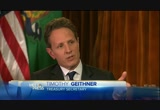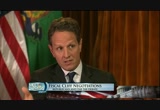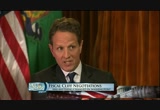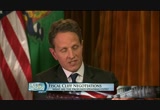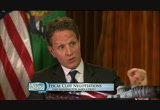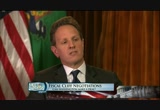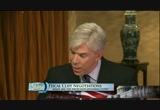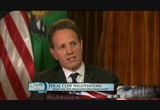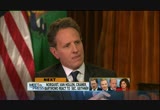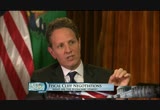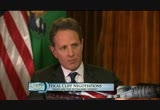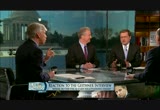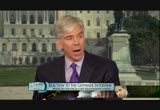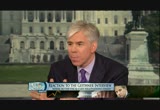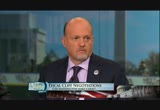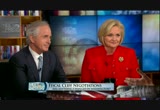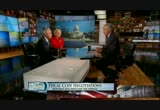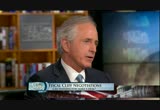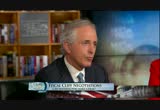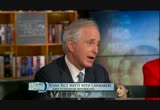tv Meet the Press MSNBC December 3, 2012 1:00am-2:00am PST
1:00 am
helps you choose person safe by a brave decision the right coverage for you at a great price. [ stomach growls ] to do what needed to be done. without feeling queasy. that's insurance for the modern world. esurance. now backed by allstate. click or call. this morning on "meet the press," our own economic summit. as the new budget battle turns ugly, has anything really changed in washington? president obama presses the case for tax hikes on the rich, and the tax cut extension for the middle class, now. >> if congress does nothing, every family in america will see their taxes automatically go up at the beginning of next year. >> but republicans aren't
1:01 am
budging, accusing the president of avoiding tough choices on spending and wasting time in the effort to avoid the fiscal cliff. >> it's not a serious proposal. and so right now, we're almost nowhere. >> will there be a deal by the end of the year? and what are the consequences for the economy if there isn't one? we'll ask the president's lead budget negotiator, treasury secretary tim geithner. then the view from capitol hill. are democrats as divided over cutting medicare as republicans are over tax increases? with us, two voices calling for compromise. republican senator bob corker of tennessee and democratic senator claire mccaskill of missouri. finally, our special economic roundtable. as both sides battle over the nation's fiscal health, what can we expect from the economy in a second obama term? what is the vision for an economic rebound? from nbc news in washington, the world's longest-running television program, this is "meet the press" with david
1:02 am
gregory. and good sunday morning. amidst a lot of partisan rhetoric on both sides, talks on the fiscal cliff are now at a stand still, and the president is back on the campaign trail of sorts. this time to try to win in a court of public opinion for his plan to avert an automatic tax hike for everyone on january 1. that's where we'll start this morning with the point man on the negotiations for all of this. the secretary of treasury, tim geithner. and our roundtable is also here. standing by for reaction, including the man behind the republican pledge not to raise taxes at all, not to raise tax rates, grover norquist. here's here. coming up, as you've heard, we'll get reaction from him as well in our roundtable. a key part of the debate is but first, i sat down with between raising tax rates as secretary geithner at the opposed to closing tax loopholes. but if you do the math, you'll treasury department late friday. mr. secretary, welcome back to "meet the press." see closing loopholes like the thank you for having us at the charitable contribution treasury department. >> good to see you. deduction won't come near the trillions needed to pay down the >> you are the president's lead debt. negotiator. you have been to capitol hill. in fact, if you get rid of the you presented the president's top 10 loopholes, which would be offer. and it immediately was not nearly politically impossible, received well. it was called by republican the u.s. government would only leaders unserious. pull in an extra $834 billion. they have accused the president
1:03 am
and you are wasting precious time here to avert the fiscal so what are the outlines of a deal with that in mind? cliff. was this the intended effect of when we come back, we'll talk to two senators who a the president's first offer? >> what we're trying to do is to make it more likely. we come together on a good agreement for the american people that extends tax cuts to the american people. brings our long-term deficits down. tough spending savings is part of that, and invest in things that matter to the american economy, like infrastructure, and getting americans back to work. we think we can do that. we have a good chance, and it's very important. and i think we'll get there, david. >> do you think we'll get a deal by the end of the year? >> i do. because the only thing standing in the way of that is a refusal by republicans to accept that rates have to go up on the wealthiest americans. and i don't really see them doing that. >> the idea that they have signalled something significant for them, which is -- >> what is that? >> putting revenue on the table. >> it's welcome that they are recognizing that revenues are going to have to go up. but they haven't told us anything about how far rates
1:04 am
should go up, how far revenues should go up, who should pay higher taxes. >> republicans have said that no republicans will vote for a tax rate increase. do you think they are just bluffing? >> i can't tell you what they are likely to do. all i can tell you is what we think makes the most sense for the american people. and we spend a lot of time talking to the business community, small business and large businesses, the last few weeks or so. the president has done that. and i think there's very broad-based support for the type of plan we've laid out, which is tough spending savings, so we can go back to living within our means, combined with modest revenue increases on the 2% of t theie wealthiest americans. >> have things changed in washington? >> oh, yes. >> how do you know that? you said this is just political theater. >> i'm not an expert in political theater, but that's what it seems like. >> well, anyone who wants a solution in washington has to ask the question, has anything really changed? what has changed in your point of view?
1:05 am
>> they have acknowledged for the first time in decades, i think, that revenues are going up. that's good. but we need to know what they are prepared to do on rates and revenues and on the spending side. again, we have laid out a detailed plan of spending cuts. $600 billion in spending in mandatory programs over 10 years. they phase in gradually, build over time. they are good policy. they make a lot of sense. on top of $1 trillion in spending cuts, defense and other programs enacted last year, which stay in place over 10 years. and if they'd like to go beyond that or do it differently, they need to tell us what they propose and we'll look at it. >> one of the things they talk about here, you have four times as much in new revenue as you do in spending cuts. >> that's just political math. not real math. we have enacted $1 trillion in spending cuts last year. they are hard savings. we are living with those and we will be for 10 years. we proposed an additional $600 billion in spending cuts. detailed reforms. very difficult reforms over time
1:06 am
alongside that. and alongside those changes and the savings from ending the wars -- >> do you specify spending cuts as part of this deal? >> detailed reforms that add up to $600 billion. i'll give you some examples. we are reforming farm subsidies. it makes a lot of sense. in health care, modestly increase premiums for high income beneficiaries of medicare. it makes sense. we'll hear more from our makes the government much roundtable in just a bit. but first, i'm joined by two key smarter for how they buy voices calling for compromise. medicine for people under tennessee republican bob corker medicare. those are just three examples. and missouri democrat claire mccaskill. but there's $600 billion of welcome to both of you. examples in the president's proposals. if the republicans don't like those ideas, and they want to do senator, what's changed in washington? where is the room for real it differently, they want to go beyond that, they have to tell bipartisan to avert this fiscal us what makes sense for them. cliff? does it exist? and then we can take a look at >> i think it does. i think we understand that this it. but what we can't do is figure is about our country first. out what makes sense for them. and it really is a time we need >> in terms of tax rates, in to put politics aside, and it's your mind, you don't have to go going to be painful. back to the clinton era tax none of us are going to get the rates for this to be a workable deal that we exactly want. deal. >> well, i think you do. but we have to keep talking to >> all the way up? >> again, our proposal is to let one another. and bob and i have talked this those rates go back to clinton week. i'm talking every day with my
1:07 am
republican colleagues. levels for 2% of the wealthiest what has to happen, though, there has to be a realization americans. and combine that with tax that if we do nothing, the reforms that limit deductions republicans are going to have to for the wealthiest americans. we think if you do that, live with the fact that they are alongside the spending savings, willing to stop a deal all over then you can put the country a tax rate for the top 2% of back on a much more responsible this country. fiscal path. >> including getting rid of the and, frankly, i'm really hopeful mortgage interest deduction or that doesn't happen. the charitable giving deduction? and i know bob feels the same way. do you think those have to be on >> senator, lindsey graham has the table and looked at? said in this past week, quote, >> we have proposed -- and we no republican will vote for did this four years ago -- a higher tax rates. carefully designed way to limit will you? >> well, the negotiations are modestly the value of all of between the president and speaker boehner. those deductions for the and they will get into the wealthiest 2% of americans. details of that. there are other ways to do it. i think you know i've laid out a we can take a look at those plan that has $1 trillion in ways. but there's no way you can do this in a balanced way that revenues, coupled with real entitlement reforms. restores fiscal responsibility without tax rates going up. >> but higher tax rates. >> one of the things i've heard you heard treasury secretary geithner. they are going to force this talking to republicans today is this notion that you want to issue and say to republicans, it's over. take away congress' ability to the tax fight is over. rates have to go up. have the authority over the increasing the debt limit, is a the president won re-election. he made this argument. the american people are behind him. that's what they are going to total nonstarter from a republican point of view. argue. does that have to be in there in and they are going to say grover norquist, forget him, tax rates your point of view? have to go up. >> this is very important, and are you willing to accept that?
1:08 am
let me tell you what's at stake. >> look, speak are boehner and we are not prepared to leave the leader mcconnell both have put economy of the united states and revenues on the table. the savings of americans, the >> let's just understand. savings of investors, vulnerable everybody in washington says revenues. to periodic threats by there's increasing your tax republicans to default on the rates and there's finding other ways to raise tax revenue. and the distinction is american credit. >> democrats have made the same important, because what threats in the past, have they republicans object to is raising your tax rates. not, including the president? >> there's no precedent in the your actual marginal tax rates. many decades of history of this, that's the distinction that you of what the republicans tried to have to answer, right? >> well, you can get there two do in the summer of 2011. ways. one of the ways is the way i you saw how damaging that was. we're not prepared to go through proposed, which is closing loopholes. that's a pro growth way of that again. but we made a very sensible getting more revenues from wealthy americans. suggestion, and let me describe and i think, david, before this what that is. what we proposed to them if they is all over with, there's lots extend what's called the mcconnell provision. this was a solution senator of mathinations. mcconnell offered last summer, there's capital gains, which was enacted in the summer dividends. and i think cooler heads will of 2011, into law and supported prevail. and i think we will resolve by republicans. this. and the way that works is the and that's the very best thing we can do to get our economy president would have the going. >> you heard secretary geithner. obligation periodically to request an increase in the debt you've heard the president. you can't get enough money in revenue unless you raise limit, and congress would have marginal rates. the chance then to express its >> well, and here's the deal. views on the merits of that here's the reality. proposal by disapproving that, let's assume they won't go for and then the president would have to decide if a bill came to any raising in the rates.
1:09 am
his desk about whether to veto then all the bush tax cuts are or sign it. and the virtue of that mechanism going to expire, and then we would come back in january, first thing, and pass a tax cut proposed by senator mcconnell, a man of impeccable conservative for everybody under 250. credentials, is to make sure are the republicans going to that the country is not left at vote no on that? of course not. so they are going to get stuck with a raising of the rates of risk of pure default. it's a very good idea. the top 2% either in a very it's a republican idea. and we're suggesting they extend painful way or in a way that we it. >> let me come back to the idea can all suffer a little bit, of, what is the pain point for address all three legs of the stool, entitlements, cuts, and democrats here? what is the pain that democrats revenues, in a way that makes are going to have to be willing to live with to get the kind of sense, and does make the very deal that you're driving with wealthy go back to a tax rate, republicans on taxes when it by the way, in the '90s when we comes to both spending cuts, were raining jobs. particularly spending cuts to had a lot of prosperity. programs like medicare? >> well, i think that it's true that little bit in tax rate difference, i haven't talked to that both sides are going to have to do things that are difficult for them, people in the business community uncomfortable for them. that think that's a nonstarter. >> back in the '90s, you talk and the american people have already been asked to adapt to about president clinton's deal. there was a lot of reality there that was tough. first of all, the president $1 trillion in spending cuts in believes that democrats ended up defense and nondefense that losing the house because of that touches the lives of many, many deal. there were no republican votes in the house for that deal. americans. >> you're not suggesting the and there were significant cuts to defense spending as part of sequester stay on the defense that 1993 deal that everybody spending? >> we're talking about the cuts only remembers as raising taxes. of last year. we want to replace the sequester
1:10 am
of last year with different cuts. >> on defense? liberals say there still should >> i know. be significant cuts to defense. but this deal is important enough that everybody ought to think it's important enough to >> people say that, but we'll look to the pentagon for what makes the most sense for the go only over. that's what we're waiting on national security needs are the now, the game of chicken to put country. but what we proposed top of the painful stuff out there. those $1 trillion savings of the president has put $600 billion in cuts out there. last year is $600 billion in he has said the tax increases detailed reforms to our health for the top 2%. care programs and other now it's time for us all maybe government programs that over 10 together to hold hands and say, years yield very substantial let's look at some of the things savings. again, david, republicans have we've got to do structurally to said that they don't like those reforms. they'd like to do more. get this fiscal cliff that taken and if that's true, they should care of. >> let me show you this report from politico, which kind of bottom lined where we are. tell us what they'd like as an alternative or compliment to this is what they write on those. friday. both sides privately acknowledge we can't react to anything 2348 they are playing familiar roles until we see the details of the in a largely choreographed drama proposal. and we need it on the rates and revenues as well as the spending whose precise end may not be side. known but is likely to include a we have given them our view of what makes sense for the country. we think we'll have enormous sizeable tax hike on the order support. of $1 trillion and a pledge to >> is it fair to go to republicans, many of whom were come back next year to come back next year and try really hard to re-elected just like the president was re-elected in do entitlement and tax reform. their own districts and say, look, we're going to get republicans say privately they specific when it comes to the were not surprised with the tax increases we want, but we'll initial salvo. the white house notes it has put
1:11 am
be vague when it comes to stuff its wish list on the table, that's hard for our side, which is medicare. rallied democrats to its side, >> that's a misperception. we propossessed $600 billion in pushed republicans into the savings. position of having to counter with painful spending cut people can take a careful look proposals. so the ball is in the at them. what we haven't seen from the republicans' court in terms of what pain america has to go republicans is a plan to raise through in terms of spending rates and revenues. cuts. >> i think that's right. they said they are prepared to raise revenues. but they haven't said how, how much, or who should pay, and the whoite house has put out haven't proposed what they need something that polls well, which on the spending side. is taxing the wealthy. we can't figure out what they most americans don't realize need. they have to tell us. and then we have to look at it that the average family in and see if it makes sense for the american people. america today pays into medicare >> when you look at the economy throughout their lifetime $119,000 in today's dollars. overall, growth at 2.7% last they take out over their lifetime in today's dollars $357,000. quarter. how does the economy get out of this slump? and so the president has laid what is our economy doing well right now? nothing out there to change that what are we not doing as well as a country to deal with our dynamic. >> on medicare, which is so economy? >> good question. the economy now is actually interesting, because what happened the last time there looking quite resilient. were cuts that were actually if you look at what's happening enacted as part of medicare, we in energy, enormous boom. had a presidential campaign, and in agriculture, even with the here was mitt romney's ad, targeting the president. this is what he did. drought, you're seeing incredible levels of income to farmers, which is really >> you paid into medicare for years. welcome. in manufacturing, one of the every paycheck. strongest periods of
1:12 am
manufacturing revival that we've now when you need it, obama has seen in almost a generation. not just in autos, and not just cut $716 billion from medicare. in high tech, but comprehensibly >> now, those were not benefit across that. cuts. we are showing american those were provider payments. companies very competitive and so if you're the president, why resilient, and companies are bringing back production from specify what cuts you're going china and mexico because this is to make in medicare if that's looking like a much stronger the treatment that republicans will give you? country in which to invest and >> well, until we get to build. those are very encouraging signs entitlements, we're really not for the american economy. having a serious discussion. and people running america's david, all of us know what the businesses would say they are in options are. the strongest position they have they are not going to get more been in maybe a decade in terms narrow as -- i mean, they are of the ability they have to going to get more narrow as time expand and grow. and if we are able to lift this goes on and more draconian. what you're talking about is threat, big tax increases on where we solve this fiscal cliff middle class americans, lift this threat of periodic threats by creating another fiscal cliff of default, lift this threat of down the road is totally immature. it lacks political courage. badly designed deep austerity on we know what needs to be done, and let's get it done over the the spending side up front, then next three weeks. the options are not going to i think there's enormous change. >> would you call on your party not to mount that sort of potential for the american opposition to the president if economy to grow faster going he specifies how he's going to forward. >> and if you don't, the stakes, restructure medicare? the consequences, are severe? >> i think that both -- look, i >> oh, yeah. have laid out in great detail to go over this fiscal cliff, because republicans won't raise very painful cuts to medicare. taxes, tax rates on the i just did it in a 242-page bill
1:13 am
wealthiest 2% of americans, would subject the average that i have shared with the american to big tax increase and white house, shared with boehner, shared with mcconnell, enormous damage from the other in order to move us beyond this cuts that would happen. silly debate that's taking and there's just no reason why the country has to go through place. the fact is, claire knows this that. and we have a chance to do and i know this. something much better. there are serious reforms that not just for the long-term have to take place in medicare health of the american economy, but for the immediate challenge for our country to become which is getting stronger growth solvent. >> well, we have to be careful. and you're right about this, and more job creation. >> but you heard the president david. what is really irresponsible, say today if there's no deal, that $716 billion, that was are you going to blame the republicans for ruining christmas? low-hanging fruit. that was fluff in the medicare >> the only thing that stands in the way of a deal right now is system, savings that we had to recover. and by the way, it's the same if a group of republican members savings that was in the ryan plan. decide they're going to block a the notion that that used as deal because they want to extend tax cuts. we can't afford for the a political two-by-four in this wealthiest 2% of americans. past election was wrong. we need a mutual detante -- >> the president said on >> and i actually agree that the election night, you voted for politics, not action as usual. ad was not the kind of ad that i would run. you're saying what we can expect from republicans. what can we expect from the i do think the $716 billion president to break that cycle? should have been used to make >> a willingness to sit down and medicare more solvent. explore what the best way to get but what we did was create through this is that's in the another entitlement. interest of the american people. that was the problem. not just now, but for future but the $716 in changes should generations. again, we've been very clear
1:14 am
about what investments we need, have taken place. what savings we can do, how we should have just used it for we're going to pay for that and medicare instead of -- >> let me challenge you on how to make sure we're protecting the american economy democrats not being specific on from a broad tax increase on how to restructure medicare. middle class americans. is it responsible for the met to >> mr. secretary, thank you. >> nice to see you. my interview with secretary present a vision being specific geithner. and now for reaction and analysis, i am joined by our on tax hikes but on medicare saying, we'll get to a specific roundtable, cnbc's dynamic duo this morning, maria bartiromo number but we won't specify? is it because there's so much and jim cramer. pressure on the left to not reform medicare? >> i think it's certainly a congressman chris van hollen. fight. and i think we have to be careful. and grover norquist. we have to make sure -- i think has anything been said about you we can get to means testing this week? i don't know. i can't remember. grover, i want to start with you fairly easily. some higher co-pays for people as we get first reaction to who can afford it. as i said before, donald trump may need medication but he secretary geithner. the line in the sand is clear, doesn't need the government to pay for it. we've got to get to a point and that is that the administration, the president, says that republicans will where we are really having people who can afford to pay for indeed blink, that they will their health care, having them take that responsibility. ultimately have to acquiesce, tax rates have to go up. >> that's the position the president should adopt in your >> well, your interview with him view? >> i think so. i think aggressive means testing was very, very helpful to me for people who can afford it because in the past, there have makes sense as we look at been some republicans who long-term savings in the thought that maybe the medicare program. but here's the thing. administration, like clinton, bob and i both know, he and i was going to be reasonable, that
1:15 am
are talking and i think we can they might put real reforms like get a deal through the senate. the question is, i feel almost sorry for john boehner. welfare reform like clinton did on the table. what we just heard was no there is incredible pressure on reforms. he even took the $1 trillion in him from a base of his party spending cuts they agreed to, to that is unreasonable about this, the debt ceiling, took that off. and he's got to decide, is his so we'll spend $1 trillion more speakership more important, or is the country more important? there. 24 this is a massive collection and in some ways, he has got to of spending increases and tax deal with this base of the increases. every republican who had impure republican party who grover norquist represents, and, you thoughts of maybe i could raise taxes a little because the other know, everybody's elevated guy would be reasonable has to go back to the drawing board. grover -- i met him for the they have just been told there first time this morning. are no real reforms in this nice to meet him. budget at all. but who is he? why is he this guy that has >> but what about the -- captured so much attention in >> $1.6 trillion in tax this? increases, and some of the let's talk about our country and -- savings are actually tax >> but, senator, let's also talk increases. about spending. >> how about the direct point? again, you talk about 1993. the treasury secretary telling me, look, republicans are not going to stand in the way of tax president clinton cutting rates going up. upwards of $250 billion from defense. name some specific programs that true or false? ought to be cut that would cause >> republicans want to continue pain in terms of the role of our the bush tax cuts and the government that democrats are prepared to support. extenders and the amt patch and >> well, i think you can see so on. and what we did two years ago, more cuts frankly and a lot of what clinton signed two years us voted for more cuts in the farm program. ago, with a democratic house and
1:16 am
a democratic senate did two $23 billion in savings in the years ago, is exactly what we should do now to start with. farm bill that's languishing in it's the president who is the house right now. threatening to raise taxes on $23 billion a year in deficit savings. the middle class if he doesn't actually cutting money out of that program. stamp his feet and get his way. there are other programs like that we can do away with some of he needs to get into a room with the job training programs. there is duplication there. cameras there and negotiate. >> and defense? >> and defense. i spent a lot of times in the that was all show and no wings of the pentagon. if you don't think there's more economics. money to be cut in contracting have it in front of cspan at the pentagon, you don't understand what has happened at cameras. if the republicans are reasonable, we'll see that. if not, we'll see that. the pentagon. >> should these sequester cuts have cameras there. >> congressman van hollen, you on defense be upheld, senator? have speaker boehner saying this >> david, as much as i love morning to fox, we are nowhere. claire, those are not the painful cuts that have to this was an unserious proposal. happen. we really have to look at much deeper reforms to the entitlements. is it just political theater like the treasury secretary and i would say that speaker said? >> well, what's happened now is boehner's biggest problem is not that the president has put his base. forward a plan. it's transparent. it's on the internet. it's having a willing partner on speaker boehner needs to come the other side that's really willing to look at these kinds forward and put his counterplan of reforms. on the table right now. and i think that's going to that's what has to happen. so when speaker boehner says happen. i think there's a possibility anyway. we're at a stalemate, it's because he refuses to put but i don't think it's his base. i think the speaker is forward other options. let's be really clear on what frustrated right now because as the president has said. you've mentioned, the white he wants to extend tax relief house keeps spiking the ball on for 100% of american families tax increases for the wealthy.
1:17 am
and small businesses on their but has not yet been forthcoming first $250,000 of income. and what republicans are saying on real entitlement reform. and without the two, there really is no deal. it is, nobody gets that tax >> i want to come back to taxes. relief unless folks over grover norquist, who will be back in just a minute on our roundtable. he has said pointedly, you $250,000 get the extra four wouldn't have been elected cents on the dollar that they senator had you not signed that were getting compared to the clinton tax rates. pledge not to raise any taxes. and i just don't believe that are you prepared to break the the american people are going to pledge now? >> i was just elected to the accept the republican position senator 3 1/2 weeks ago with when we need to extend middle claire. class tax cuts and get serious everybody in the state of tennessee that cared about about our long-term deficit reduction. pledges knew that the only pledge i was going to honor is >> gamesmanship. the oath to office. that's justt that's the big piece of this. true. what's the bottom line? >> you will vote to raise taxes does the president have a chance if that's what it takes to get a to prevail with how he's going deal? about this at the moment? >> i am not obligated to any >> at this point, it looks like pledge other than my oath. i want to solve this problem. both sides are digging in. based on that interview, it and where republicans are today, looks like the president is we can look at a $5 trillion tax digging in and that's unfortunate, because it doesn't increase with nothing on seem like we are looking at entitlement reforms by just compromise right now. as far as the economy is concerned, we will see a hit to being passive and not -- >> but you did sign it in the the economy if in fact both first place. sides continue to dig in. you understood the importance of and the markets right now are getting elected. expecting a deal. >> well, i understood the the markets have been trading importance of getting elected fine. if we don't get a deal, we're the second time. and everyone was fully aware going to see a sizeable decline before any votes were cast in stocks. we are going to get a big exactly where i am.
1:18 am
disappointme disappointment. >> before i let you go, i want >> jim, let's talk about it. to bring up susan rice. when we go over the fiscal if she is nominated as secretary cliff, what happens? the bush tax cuts expire january of state, you said she has proven to be more of a political 1, so they automatically go up to clinton era levels. operative. will you support her in the end if she is the nominee of the the 2011 payroll tax holiday president? >> i don't think she'll be expires. nominated. but i have told people certainly the alternative tax kicks in. i will give her a fair hearing. and then you have $1 trillion of i do think that the underlying cuts, half of which is in issue here is people have seen defense. her far more as a political how is the president doing in operative and not a principle. his pitch so far, both in his and i think that's what the first offer and how he's going white house is witnessing right now. to the public to sell this? >> i think he's doing pretty >> i think it's terribly unfair well. i think he is calling for what has happened to susan rice. i do not understand for the life compromise. compromise means no firings of of me the talking points came any great magnitude starting january 8. from the intelligence community. yet you don't hear one criticism january 8, that's the first of david petraeus. company reports. there will be a foot race to it was his shop that produced fire. who can fire the most? the talking points that susan who saw the recession coming? and i think that compromise, rice talked about, and she which i believe the president is actually offering, avoids those mentioned al qaeda in the firings. interviews that sunday morning. avoids the big spending problems and you go back to condi rice. that you're going to see. there's no valentine's day. there's no easter. i mean, really? there's no big spending days is there a double standard here? it appears to most of us that coming if you go through and don't compromise. there is, a very unfair one.
1:19 am
>> here's what i think is going this is a strong, smart, on in part, grover. capable, accomplished woman. the president is being as aggressive as he is with this and i think that there is too initial proposal, putting many people over there that are boehner in a position to fight looking for a scalp. >> so you're saying that the him hard, so if boehner can win president should take on this some concessions, that he can look better. that he can say to his caucus, fight? >> i don't know whether he should take on the fight or not. i know this. look, we fought the good fight what has happened to susan rice is terribly unfair. here. i dialed them back from where they were significantly. if you really understand what went on, it is terribly unfair we've got to take this tough that she had be the scapegoat medicine. >> it might work, except you for this when really the left a couple of things off. failures ought to be at the last there's $1 trillion of obama of the head of the intelligence care taxes hitting in the next several years, many of them community that produced those major taxes. if you have a flexible savings talking points, but none of the guys will say a word about david account on january 1 -- this petraeus. >> more to come on this, isn't the fiscal cliff. obviously. thank you both for being here this is what obama has already very much. baked into the cake. your flexible savings account when we come back, more from our roundtable. will be trashed by taxes. we rejoin the conversation and broaden it out a little bit to millions of special needs talk about the broader vision families will find their taxes go up. if you're really sick, you can't for the economy over the next talk about the broader vision f[ female announcer ] bornext from the sweet monk fruit, deduct as much of your health care costs as you used to. these are all the ways that obama's raising taxes, $1 something this delicious could only come from nature. trillion, $1.1 trillion, over new nectresse. the next decade. the 100% natural no-calorie sweetener five major taxes. his new taxes are not off the made from the goodness of fruit.
1:20 am
table. they hit directly into the middle class. new nectresse. medical devices. sweetness naturally. when you go to the hospital, medical devices like riding in a wheelchair will get more expensive because of this tax. i mean, these taxes are damaging. he wants to make them permanent. >> i think grover knows that the major source of additional taxes is part of the affordable care act is asking higher income individuals over $250,000 to pay higher capital gains and more on their medicare contribution. that was the bulk of the taxes. so to suggest that this is a big tax increase on middle income americans is just not right. the president's proposing that we extend tax relief for the middle income americans. that's what we've got to do. >> if you have a flexible savings account, you're being damaged. >> let me do this. we'll have much more on this later, including what i still think is the big question that hangs from this interview, which is, is the tax fight essentially over? the one that you have been waging, grover norquist. we'll have more on that. i want to take a break.
1:21 am
more from our roundtable later in the hour. but up next, i'll talk with in the hour. >[ female announcer ] born with from the sweet monk fruit, something this delicious could only come from nature. new nectresse. the 100% natural no-calorie sweetener made from the goodness of fruit. new nectresse. sweetness naturally. like say, gas station sushi. cheap is good. and sushi, good. but cheap sushi, not so good. it's like that super-low rate on not enough car insurance. pretty sketchy. ♪ and then there are the good decisions.
1:23 am
we are back with our roundtable for more on the economic vision over the next four years and how the fiscal cliff plays into it. and it's like those presidential debates, grover norquist. when you're mentioned by name, we have to give you a chance to respond. you heard senator mccaskill. but how about the headlines this week? you have been front and center in the debate. here are some of the headlines. "the new york times" really stands out. is grover finally over? and then, this is really about the pledge that you introduced that is a pledge between these office holding republicans and the people who have elected them. it's not a pledge to you, as you often point out. the bottom line is, are you over? is this tax fight over? >> well, actually, that was last week's news. the president and mr. geithner have really changed the direction here. because there were a few people, including the senator you just had on, who were seduced into
1:24 am
thinking, well, maybe i'll have a small, tiny tax increase and have real reform and move forward. >> you're talking about corker? >> and there were others who said -- and, look, corker wants tiny tax increases and very serious reforms. but you're not going to get that. what the obama administration and geithner said is massive tax increases and zero reforms. our savings come from not occupying iraq for the next 20 years. the budget they put forward was laughed out of the house and the senate last year. no democrat wanted to agree to that before they ran for re-election. >> but you're making the case because there is still the fundamental question of whether republicans feel beholden to the position that they cannot raise taxes, even if it's mandatory for how government out to operate. >> well, it didn't work that well in greece. not so positive in spain. these countries were deeply committed to your position.
1:25 am
no tax increases. >> those states were bankrupted by their overspending. >> no one wanted to pay for it. >> the modern republican party wants less taxes and lower spending. they passed a ryan plan which reforms entitlements, reforms taxes, doesn't raise taxes. it's the democrats who don't have a legislative budget. >> make the case for why you view this the president making a truly balanced approach to not just solving this problem but really moving the economy forward. >> well, he has. and first of all, let's be clear. the way you get massive tax increases, $5 trillion tax increases, is if you go over the fiscal cliff. what the president has said, let's just ask higher income individuals to contribute a little more to reduce our deficit to prevent that from happening. the president has taken a balanced approach. look, we already entered into $1 trillion in cuts which we'll have to enforce and implement over the next 10 years, including, by the way, cuts in defense. you mentioned defense cuts as part of the clinton deal. >> that was 1993. >> we did the first half of the clinton deal as part of the budget control act. we're going to do $1 trillion in
1:26 am
cuts. as secretary geithner pointed out, the president's budget contains additional cuts. and i don't think people recognize this. the president's budget over the next 10 years has more additional savings in medicare than the republican ryan budget over the next 10 years. let's see their plan. the reality is, they attack the president viciously, claiming he cut medicare by $716 billion. what they wanted to do was to add that $716 billion back into medicare, which would have cut the solvency by eight years. so they attack him for $716 billion, and now they are coming around saying, mr. president, you don't have enough medicare savings in your plan when in fact his plan over the next 10 years -- >> well, both things can be true. there's still not enough detail about how you fundamentally restructure medicare because the president does not want to make that commitment yet before he solves the tax issue. we'll come back. >> absolutely the right point, david. the fact is i find is extraordinary that we are zeroing in on this discussion only about taxes and we do not
1:27 am
have this kind of discussion when it comes to spending cuts. two points. americans realize that the three biggest drivers of our debt are medicare, medicaid, and social security. we need structural change. we haven't heard that. number two, on taxes, you really can't put all of the taxes into one category. dividend taxes, for one, is probably the biggest threat to the markets and the economy right now when you're just looking at taxes. and dividend taxes are not a rich tax. nor a capital gains. you're talking about pension funds, 401(k) plans, invest in companies that pay dividends. if you're expecting a dividend tax to go from 15% to 44% that, completely removes the opportunity or the incentive to buy dividend paying companies. and that's going to hurt not just the rich. that's going to hurt everybody if we see that. that's very dangerous, and it would create a massive selloff. >> one of the things that the president has done, going to congress and said, going out and encouraging people to tweet and post on facebook my 2k, meaning the $2,000 they would get in the
1:28 am
extended tax breaks for the middle class. but he is also meeting privately with ceos. he has a bad relationship with wall street and with corporate america generally. he has presented much of this plan. what's the feedback he's getting? >> there will be a big recession if you don't get behind him. i'm finding many republican ceos -- by the way, most ceos are republican. they are on board. they are not on board with you because they fear your view because they think that you do not favor going -- you favor going over the cliff. that's what they think. they think that you favor -- >> just for the record, since we're on tv, that's silly. if they think that, they shouldn't be in office. >> they had 13 months to deal with this. we are down to 29 days. the time for opening salvos is over. >> two years ago, we had exactly the same conversation, even here, on the question of having a debt ceiling increase. and the democrats wanted $1.6 trillion in higher taxes. they didn't want to reduce spending. and eventually we got $2.5 trillion in spending committed
1:29 am
without tax increases. we got a good deal. now the president wants to take back off the table spending cuts that are already in lock. so when he talks about spending restraint, he is adding $1 trillion, $1.5 trillion, you might count $2 trillion, in additional spending by taking the $1 trillion away and deciding he'll put off the sequester forever. he has a massive spending increase because he is trying to undo his previous agreement. i opposed going over the cliff two years ago. we didn't. we cut spending. i'm not for it this time. two years ago, we extended all the bush tax cuts. we didn't go over any cliff. it's the president who is in the bank screaming he'll shoot the hostages and it's your fault if you don't give him everything he wants. that's not a reasonable position, and it won't hold. >> congressman, what are the chances we do go over the cliff this time? >> i think the chances are better that we will not go over the cliff. i think we will be able to get an agreement on the sequester to replace the across the board cuts substituted with other savings. and i believe we will come to a
1:30 am
resolution on this tax issue. but i believe it because what senator mccaskill and secretary geithner said is true, which is i don't think people -- i don't think it's sustainable to go into january saying that the great mass of the country isn't getting tax relief because they are holding out for this bonus tax breaks for folks at the top. we'll take a break and then [ female announcer ] caroline penry began using olay total effects in 2001. since then, there's been one wedding, 2 kids, and 43 bottles of olay total effects. so in spite of 185 tantrums 378 pre-dawn starts and a lot of birthdays, caroline still looks amazing. you can challenge what's possible thanks to the trusted performance of olay. 60 years, millions of women, real results.
1:33 am
we're back. final minutes with our roundtable. you just said it. you want to respond more to what grover is saying on the ultimate deal. >> he is talking about seducing, that the republicans have been seduced. impure thoughts. this is not a pornographic debate, grover. this is about avoiding a recession, which is going to happen. i know you don't want a recession. you don't want people laid off. you're going to sacrifice that for the 2%? is that what you want? >> no. you have to listen to both what the republicans are talking about -- again, i'm supportive of the republican position, which is we need to have economic growth, not higher taxes. if we grew at 4% a year instead
1:34 am
of 2% a year, reagan levels instead of obama levels, for one decade we would ned net $5 trillion in additional revenue. >> no obama care. no threat of regulations. understand how ugly the next four years will get. everything in obama care that obama didn't want you to focus on or think about, the 90% of his trillion dollar tax increase was pushed over until after he got himself safely re-elected. all those regulations you're now hearing about, ok, that are being talked about, those all hit after the election. we got four bad years of regulation taxes. he wants to add higher taxes to that. tea party two will dwarf tea party one if obama pushes us off the cliff. let's not pretend he isn't pushing us off the cliff. >> maria, the broader question, where is our economy right now as we're tackling this issue?
1:35 am
what's the economy doing well? what's it not doing as well? and what will we see over the next four years? >> we are moving at a slow pace. at this point in the recovery, you would expect faster growth, which we are not going. if we go over the cliff, we will go into recession. a couple of industries will feel the hurt more so than others. obviously, defense. and because these are long-term projects, those defense cuts will be felt well into 2013, into 2014. what's doing well? health care is doing well. we're living longer. living until 100 years old. that's a positive. it's not a crisis. it's a positive. so we are in need of 1 million nurses, health care professionals in the coming years. technology doing very well. a lot of start-up technology. innovation going well. that's a positive. manufacturing coming back a bit as well. the auto sector. however, everything can change in a nanosecond. yes, it's resilient. i agree with the secretary. however, very, very fragile. particularly with this fiscal cliff. >> well, we haven't talked about one of the big pieces of the
1:36 am
fiscal cliff, which actually has a way bigger impact on the economy than tax breaks for the folks at the top, and that's the payroll tax extension for 160 million americans. the nonpartisan congressional budget office says that gives you the most bang for your buck economically speaking. i believe we have to extend that for a year or come up with some alternative way of doing that. let me say a quick word about medicare reform. there's a difference in outlook. we believe we have to find savings in medicare. the president did, $760 billion, and we can build on that by trying to modernize the system, reduce costs overall in the system, not simply transfer rising health care costs onto the backs of seniors on medicare. $22,000 median income. that's what the voucher plan did. we believe we can find savings by changing the way we reimburse doctors and hospitals. not by across the board cuts, but by focusing on the value of care, the quality of care, not the volume of care and the quantity of care. >> one final bottom line question for grover norquist.
1:37 am
in this deal, are there new taxes in the end? i know what your position is. but what does reality tell you? >> this can play out several ways. if we have tv cameras in there, cspan there, if we have seven days of bills -- these are 24i7k things that obama promised. >> no, that's not going to happen. >> we are going to get tv cameras in there. what i'm tired of is people saying one thing and then doing something different. >> will it go up? >> it depends. if people watch it on c span -- >> he talks about cspan and transparency. the president's plan is out there on the internet. let speaker boehner put your plan on the internet. >> is that the plan now? >> we have to go. we recently celebrated the 65th anniversary of "meet the press." to mark the occasion, nbc publishing will soon be releasing a new ebook, "meet the press," 65 years in the making,
1:38 am
177 Views
IN COLLECTIONS
MSNBC West Television Archive
Television Archive  Television Archive News Search Service
Television Archive News Search Service  The Chin Grimes TV News Archive
The Chin Grimes TV News Archive 
Uploaded by TV Archive on

 Live Music Archive
Live Music Archive Librivox Free Audio
Librivox Free Audio Metropolitan Museum
Metropolitan Museum Cleveland Museum of Art
Cleveland Museum of Art Internet Arcade
Internet Arcade Console Living Room
Console Living Room Books to Borrow
Books to Borrow Open Library
Open Library TV News
TV News Understanding 9/11
Understanding 9/11


